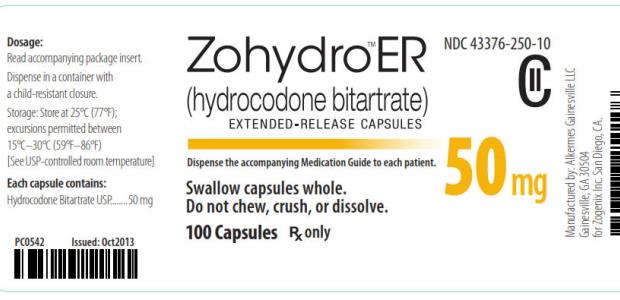
Taking Aim at Zohydro Won't Solve Opioid Abuse: FDA's Commissioner
Dr. Margaret A. Hamburg writes that the states "have an important role to play in addressing a critical driver of opioid abuse -- inappropriate prescribing practices. However, we can't just focus on one drug, Zohydro, alone."
New requirements in Massachusetts and Vermont that health care providers screen for abuse risk and document medical need before prescribing the opioid ZohydroTM ER are not the right approach, FDA Commissioner Dr. Margaret A. Hamburg New contends in an April 29 "FDA Voice" blog post that calls instead for comprehensive policy solutions. In it, she defends FDA’s decision last October to approve Zohydro for treating pain that is severe enough to require around-the-clock, long-term treatment and for which alternative treatments have been inadequate.
However, FDA's own advisory committee voted 11-2 against approval because of concerns about misuse, and 29 states' attorneys general have asked FDA to reconsider, the authors of an April 23 New England Journal of Medicine article about the issue reported.
"The recent attention paid by state policy makers around the serious public health problem of misuse, abuse, addiction, and overdose of prescription opioid painkillers is commendable," Hamburg wrote. "These efforts reflect the strong desire on the part of states where communities have been devastated by opioid addiction and overdose to prevent further tragic loss of life. However, it is important that such efforts comprehensively address the real root causes of the problem, are grounded in science, and will make a real and lasting difference.
"The most recent state actions in Massachusetts and Vermont would require healthcare providers to take certain steps such as screening for abuse risk and documenting medical need before prescribing the opioid Zohydro ER. They would also require prescribers to participate in and regularly check state databases that track how often the drug is prescribed to a given patient – a measure that can help identify misuse. Such requirements are consistent with the essential tenets of numerous medical society guidelines on appropriate pain management and – simply put – are precisely what responsible physicians should be doing. As the entities with responsibility for overseeing the practice of medicine, the states have an important role to play in addressing a critical driver of opioid abuse – inappropriate prescribing practices.
"However, we can't just focus on one drug, Zohydro, alone. These requirements would not apply to the prescribing of any of the other opioids on the market that account for some 250 million prescriptions and 18 billion tablets each year. Unfortunately, to date considerable misinformation appears to be diverting attention from more comprehensive policy solutions that apply to all opioids.
"Last October, FDA approved Zohydro as a new treatment option for the management of pain severe enough to require daily, around-the-clock, long-term treatment, and for which alternative treatments options have proved inadequate. We have heard from many people who must cope with often severe pain on a daily basis. These are people who need a variety of therapies to have any hope for a quality life. And, importantly, Zohydro does not include the liver toxin acetaminophen, as many hydrocodone products (e.g., Vicodin) do. Despite claims to the contrary, the fact is that the top dose of Zohydro is no more potent than the highest strengths of other extended-release opioids like Oxycontin and extended-release morphine. And since Zohydro is a Schedule II controlled substance, it is already subject to Drug Enforcement Administration prescribing restrictions. These include requiring patients to have a written prescription from their doctor instead of one provided to the pharmacist over the phone, and the prohibition of refills. Moreover, the approval of Zohydro is not likely to significantly change overall opioid prescribing and use by patients suffering from pain. Rather, the most likely patients for this medication are those who are currently taking an immediate release hydrocodone product chronically, or people taking another extended-release/long-acting (ER/LA) opioid. And this drug is unlikely to increase the number of people abusing opioids."
People who argued the approval should have been delayed until Zohydro has an abuse-deterrent formulation are putting "too much faith in the current state of abuse-deterrent technology, which is still in its infancy and has yet to be fully tested in actual market or use conditions," she added.
"Addressing the opioid crisis by focusing on a single opioid drug will simply not be effective. Instead, we must focus our collective attention and energy on the key drivers of the problem, which include excessive prescribing, illegal activity by a small number of providers, improper disposal of unused medications, and insufficient prescriber and patient education," Hamburg writes. "Let me say, in no uncertain terms: the prevention of prescription opioid abuse is of the highest priority for the FDA. Nothing can erase the tragedy so many people have had to face as a result of abuse, addiction, or misuse of opioids. But we can make meaningful progress to reduce and prevent our nation’s prescription drug crisis. FDA is committed to reducing abuse of opioids and ensuring appropriate access to pain medicines for patients in need. But it is critical that we all play a role in developing and implementing smart policies that will result in real change. We urge those states with active prescription drug monitoring programs, as well as insurers and pharmacy benefit managers, to help identify and halt inappropriate prescribing. And we urge all states to consider requiring common sense, responsible pain management prescribing practices for all opioids."